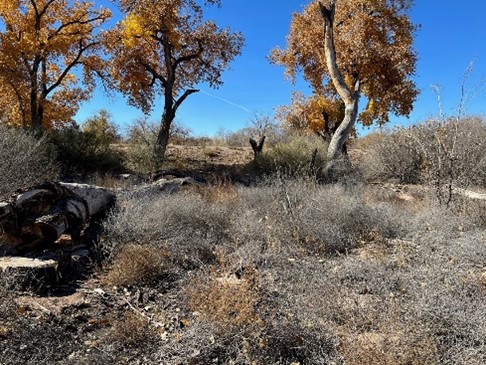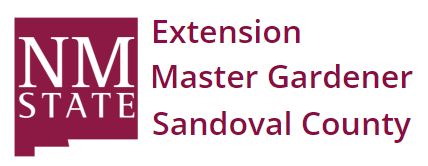Bosque Burn Scar Replanting Project

By John Thompson – SEMG 2018
A pilot project to replant a burned area of the Corrales Bosque was recently completed by Sandoval Extension Master Gardeners along with support from the Corrales Fire Department and volunteers from NM Tree Stewards, Corrales Bosque Advisory Commission, and Corrales residents. The replanting area was the result of a 2012 bosque fire that burned several acres and resulted in an unattractive, weedy, open area with downed and standing dead cottonwoods. A previous attempt at replanting cottonwood trees in the area was only partially successful with only a small number of small cottonwoods still alive. The area was also used in the 1950s as a trash dump resulting in topsoil littered with broken glass, cans, and other items.

The project was initiated by the Corrales Fire Chief, Anthony Martinez, as a pilot for a low-cost, volunteer supported approach to replanting open areas in the Bosque. John Thompson and Don Welsh (SEMG Master Gardeners and NM Tree Stewards) teamed with Chief Martinez to obtain donated plants and irrigation materials to implement the project. Trees of Corrales donated 100 native plants in #5 containers. Mike Halverson, Manager at Santa Ana Nursery, donated a dozen cottonwood poles. MRGCD, Village of Corrales Administration, Army Corps of Engineers, and NM Forestry were consulted to ensure plant selection and replanting approach was suitable for the Bosque and animal habitat.
The Three leaf Sumacs and Golden Current plants donated by Trees of Corrales are drought tolerant, pollinator friendly, provide food and habitat for animals, and provide color to the Bosque understory. The Rio Grande cottonwood poles provided by Santa Ana Nursery are 12-13-foot cuttings that can be planted in holes reaching down to the water table.
The drip irrigation system is a gravity-fed system using a donated 500-gallon cistern placed on the top of the nearby levee. The height of the levee provides a usable 4-5 psi water flow that is sufficient to supply a drip network covering an approximate 10,000 square foot planting area. The drip system is needed to establish the 100 native plants but is temporary and can be removed after a year and reused. A soil test was performed by Utah State University and confirmed the topsoil to be sandy loam with a pH of 7.7 and a high salinity level typical of this area.
The replanting project was started on December 7 with the clearing of weeds and downed wood by the Corrales Fire Department. On December 9, volunteers brought in plants, dug holes, planted and watered by hose from a CFD fire truck. Materials for the drip system were donated by Ewing Irrigation Systems. The drip system was installed over the following two weeks with emitters to water each of the hundred plants. Each watering cycle can provide 3-5 gallons per plant. The Corrales Fire Department will refill the cistern as needed to provide regular watering of the plants.
Cottonwood poles must be planted into the water table. We used a hand auger to find that the water table was at 9-10’ deep. Volunteers used the hand auger to drill the dozen holes for the donated cottonwood poles. Chicken wire cages were placed around the cottonwood plants to prevent beaver damage. Wood mulch will be added to the planting area as it becomes available from the Fire Department.
The completed burn scar replanting area will be monitored on a frequent basis by volunteers who visit the area on a daily basis. Volunteers will check for vandalism, drip function, leaks, and plant health.
At the conclusion of the pilot project, we will be able to project success in terms of plant survivability, cost (with and without material and plant donations) and aesthetic improvement of the burn scar area.
The pilot project can become a model for a sustainable low-cost replanting program for the Corrales Bosque. The team will be seeking long term commitments from nurseries and NM Forestry for native plants and will seek commitments from volunteer organizations to provide the labor for planting and on-going monitoring.




